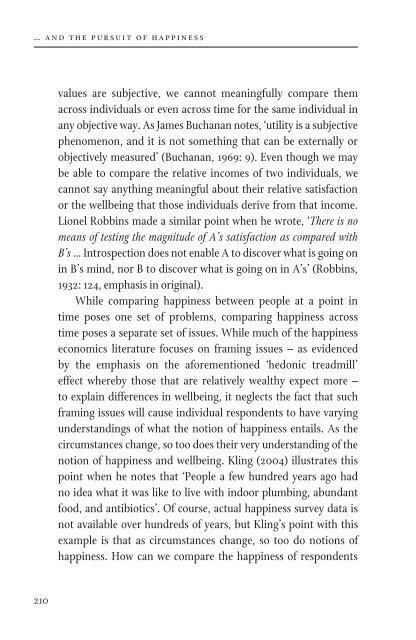… and the Pursuit of Happiness - Institute of Economic Affairs
… and the Pursuit of Happiness - Institute of Economic Affairs
… and the Pursuit of Happiness - Institute of Economic Affairs
You also want an ePaper? Increase the reach of your titles
YUMPU automatically turns print PDFs into web optimized ePapers that Google loves.
<strong>…</strong> <strong>and</strong> <strong>the</strong> pursuit <strong>of</strong> happiness<br />
lessons <strong>the</strong> from unbearable austrian lightness <strong>and</strong> public <strong>of</strong> choice happiness economics policy<br />
values are subjective, we cannot meaningfully compare <strong>the</strong>m<br />
across individuals or even across time for <strong>the</strong> same individual in<br />
any objective way. As James Buchanan notes, ‘utility is a subjective<br />
phenomenon, <strong>and</strong> it is not something that can be externally or<br />
objectively measured’ (Buchanan, 1969: 9). Even though we may<br />
be able to compare <strong>the</strong> relative incomes <strong>of</strong> two individuals, we<br />
cannot say anything meaningful about <strong>the</strong>ir relative satisfaction<br />
or <strong>the</strong> wellbeing that those individuals derive from that income.<br />
Lionel Robbins made a similar point when he wrote, ‘There is no<br />
means <strong>of</strong> testing <strong>the</strong> magnitude <strong>of</strong> A’s satisfaction as compared with<br />
B’s <strong>…</strong> Introspection does not enable A to discover what is going on<br />
in B’s mind, nor B to discover what is going on in A’s’ (Robbins,<br />
1932: 124, emphasis in original).<br />
While comparing happiness between people at a point in<br />
time poses one set <strong>of</strong> problems, comparing happiness across<br />
time poses a separate set <strong>of</strong> issues. While much <strong>of</strong> <strong>the</strong> happiness<br />
economics literature focuses on framing issues – as evidenced<br />
by <strong>the</strong> emphasis on <strong>the</strong> aforementioned ‘hedonic treadmill’<br />
effect whereby those that are relatively wealthy expect more –<br />
to explain differences in wellbeing, it neglects <strong>the</strong> fact that such<br />
framing issues will cause individual respondents to have varying<br />
underst<strong>and</strong>ings <strong>of</strong> what <strong>the</strong> notion <strong>of</strong> happiness entails. As <strong>the</strong><br />
circumstances change, so too does <strong>the</strong>ir very underst<strong>and</strong>ing <strong>of</strong> <strong>the</strong><br />
notion <strong>of</strong> happiness <strong>and</strong> wellbeing. Kling (2004) illustrates this<br />
point when he notes that ‘People a few hundred years ago had<br />
no idea what it was like to live with indoor plumbing, abundant<br />
food, <strong>and</strong> antibiotics’. Of course, actual happiness survey data is<br />
not available over hundreds <strong>of</strong> years, but Kling’s point with this<br />
example is that as circumstances change, so too do notions <strong>of</strong><br />
happiness. How can we compare <strong>the</strong> happiness <strong>of</strong> respondents<br />
in 1970 to those in 2011? Technological advances have changed<br />
life on so many margins that it is unclear how we can be sure<br />
that surveys are capturing <strong>the</strong> same concept <strong>of</strong> happiness across<br />
time. And if <strong>the</strong>y are not capturing <strong>the</strong> same notion <strong>of</strong> happiness,<br />
how can we meaningfully compare survey responses across time<br />
periods <strong>and</strong> conclude that happiness has changed or remained<br />
constant?<br />
Is <strong>the</strong>re a fixed stock <strong>of</strong> status?<br />
A core concept in happiness economics is <strong>the</strong> role <strong>of</strong> ‘status’,<br />
which refers to one’s position relative to o<strong>the</strong>rs. Just as relative<br />
income matters for wellbeing, happiness scholars contend, so<br />
too does relative status. Scholars point out that social status is a<br />
‘positional good’ – a good whose value is a function <strong>of</strong> its desirability<br />
in <strong>the</strong> eyes <strong>of</strong> o<strong>the</strong>rs. Positional goods are zero-sum from<br />
<strong>the</strong> st<strong>and</strong>point that if one person possesses status, o<strong>the</strong>rs cannot<br />
also hold that same position. This matters for <strong>the</strong> study <strong>of</strong> happiness<br />
because when one person obtains a certain status, it imposes<br />
negative costs on o<strong>the</strong>rs because <strong>the</strong>y cannot obtain that same<br />
status. Those with a relatively lower status are worse <strong>of</strong>f compared<br />
with those in higher-status positions.<br />
This logic underpins many <strong>of</strong> <strong>the</strong> policy prescriptions<br />
emerging from <strong>the</strong> happiness literature. For example, Frank<br />
(1999) argues that individuals, in seeking relative status, place<br />
too much focus on tangible goods (i.e. house size, cars, vacations,<br />
etc.) while neglecting intangible goods (i.e. commuting<br />
time, family time, etc.). It is <strong>the</strong> (over)emphasis on accumulating<br />
tangible goods, while underemphasising <strong>the</strong> importance <strong>of</strong> intangible<br />
goods, which leads to <strong>the</strong> underlying paradox. The main<br />
210 211












